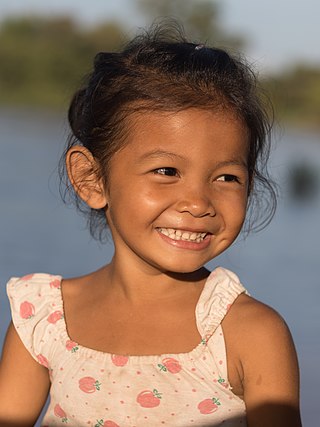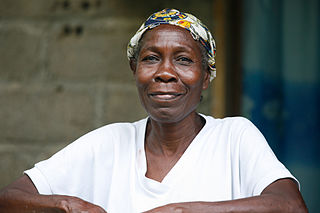Related Research Articles

Sexism is prejudice or discrimination based on one's sex or gender. Sexism can affect anyone, but it primarily affects women and girls. It has been linked to gender roles and stereotypes, and may include the belief that one sex or gender is intrinsically superior to another. Extreme sexism may foster misogyny, sexual harassment, rape, and other forms of sexual violence. Discrimination in this context is defined as discrimination toward people based on their gender identity or their gender or sex differences. An example of this is workplace inequality. Sexism may arise from social or cultural customs and norms.
Women's health differs from that of men in many unique ways. Women's health is an example of population health, where health is defined by the World Health Organization as "a state of complete physical, mental and social well-being and not merely the absence of disease or infirmity". Often treated as simply women's reproductive health, many groups argue for a broader definition pertaining to the overall health of women, better expressed as "The health of women". These differences are further exacerbated in developing countries where women, whose health includes both their risks and experiences, are further disadvantaged.
Reproductive rights are legal rights and freedoms relating to reproduction and reproductive health that vary amongst countries around the world. The World Health Organization defines reproductive rights as follows:
Reproductive rights rest on the recognition of the basic right of all couples and individuals to decide freely and responsibly the number, spacing and timing of their children and to have the information and means to do so, and the right to attain the highest standard of sexual and reproductive health. They also include the right of all to make decisions concerning reproduction free of discrimination, coercion and violence.
Gender equality, also known as sexual equality or equality of the sexes, is the state of equal ease of access to resources and opportunities regardless of gender, including economic participation and decision-making; and the state of valuing different behaviors, aspirations and needs equally, regardless of gender.

A girl is a young female human, usually a child or an adolescent. When a girl becomes an adult, she is generally referred to as a woman. However, the term girl is also used for other meanings, including young woman, and is sometimes used as a synonym for daughter or girlfriend regardless of age. In certain contexts, the usage of the term girl for an adult woman may be considered derogatory. Girl may also be a term of endearment used by an adult, usually a woman, to designate adult female friends. Girl also appears in compounds like showgirl, cowgirl, and schoolgirl.
Plan International USA (Plan) is an international development and humanitarian nonprofit that partners with girls and their communities to fight for girls’ rights and end gender inequality. It is part of Plan International, a global nonprofit federation that works to tackle the root causes of poverty by working with communities, organizations, and governments.

The Fourth World Conference on Women: Action for Equality, Development and Peace was the name given for a conference convened by the United Nations during 4–15 September 1995 in Beijing, China.

Plan International is a development and humanitarian organisation which works in over 75 countries across Africa, the Americas, and Asia to advance children’s rights and equality for girls. Its focus is on child protection, education, child participation, economic security, emergencies, health, sexual and reproductive health and rights, and water and sanitation. As of 2021, Plan International reached 26.2 million girls and 24.1 million boys through its programming.
Equality Now is a non-governmental organization founded in 1992 to advocate for the protection and promotion of the human rights of women and girls. Through a combination of regional partnerships, community mobilization and legal advocacy the organization works to encourage governments to adopt, improve and enforce laws that protect and promote women and girls' rights around the world.
Gender inequality in India refers to health, education, economic and political inequalities between men and women in India. Various international gender inequality indices rank India differently on each of these factors, as well as on a composite basis, and these indices are controversial.
There are several social issues in Armenia including poverty, high unemployment rates, corruption, and inadequate public services.

Women in Haiti have equal constitutional rights as men in the economic, political, cultural and social fields, as well as in the family.
The United Nations Entity for Gender Equality and the Empowerment of Women, also known as UN Women, is a United Nations entity working for gender equality and the empowerment of women. UN Women advocates for the rights of women and girls, and focuses on a wide array of issues, including violence against women and violence against LGBTIQ+ people.
International Day of the Girl Child is an international observance day declared by the United Nations; it is also called the Day of Girls and the International Day of the Girl. October 11, 2012, was the first Day of the Girl Child. The observation supports more opportunity for girls and increases awareness of gender inequality faced by girls worldwide based upon their gender. This inequality includes areas such as access to education, nutrition, legal rights, medical care, and protection from discrimination, violence against women and forced child marriage. The celebration of the day also "reflects the successful emergence of girls and young women as a distinct cohort in development policy, programming, campaigning and research."
Nepal, a Himalayan country situated in South Asia, is one of the poor country because of undeveloped resources. It has suffered from political instability and has had undemocratic rule for much of its history. There is a lack of access to basic facilities, people have superstitious beliefs, and there are high levels of gender discrimination. Although the Constitution provides for protection of women, including equal pay for equal work, the Government has not taken significant action to implement its provisions.
Sister Namibia, formerly known as the Sister Namibia Collective, is a feminist nonpartisan non-governmental organization (NGO) located in Windhoek, Namibia. The organization was established in 1989 on the eve of the Namibia's independence from South Africa. Sister Namibia advocates for women's rights and engages in activities that promote full gender equality in a world free from violence, discrimination, and oppression. From its inception, the organization's main function has been to produce Sister Namibia Magazine. In the 1990s Sister Namibia expanded its operations to include educational programs, research, activism, media engagement, and cultural activities in support of women's rights.
There are multiple factors which contribute to gender equality in Ivory Coast . The history of the Ivory Coast still influences gender inequality in the country. A large factor which also pushes the nation back to be a strong economic player is the lack of education especially for women. It starts from primary education up to higher level education where girls are obviously disadvantaged compared to boys. Arranged marriages for girls who are often under the age of 18 and lack of knowledge about laws and their rights also promote gender inequality.
Amanda Sussman is a Canadian author, speaker and strategist. She is the author of the 2007 book The Art of The Possible: A Handbook for Political Activism. Sussman resides in Toronto with her husband Brian Current and three children. She is known for her work as Plan Canada's head of policy and advocacy.

Sustainable Development Goal 5 concerns gender equality and is fifth of the 17 Sustainable Development Goals established by United Nations in 2015. The 17 SDGs recognize that action in one area will affect outcomes in others, and that development must balance social, economic and environmental sustainability.

The COVID-19 pandemic has had a considerable impact on female education. Female education relates to the unequal social norms and the specific forms of discrimination that girls face. In 2018, 130 million girls worldwide were out of school, and only two out of three girls were enrolled in secondary education. The COVID-19 pandemic may further widen the gaps and threatens to disrupt the education of more than 11 million girls. In addition, girls are less likely to have access to the Internet and online learning.
References
- 1 2 "Discrimination against girls 'still deeply entrenched'", The Independent, 15 May 2007, p. 1
- ↑ Because I Am a Girl campaign at Plan International
- 1 2 "Plan Goals". Plan International. Retrieved 26 September 2012.
- ↑ International Development Committee (2008). Malcolm Bruce (ed.). Maternal health: fifth report of session 2007-08, Vol. 2: Oral and written evidence. Parliament of Great Britain, House of Commons, The Stationery Office, 2008. p. 176. ISBN 9780215513847.
- ↑ Edwards, Alice (2010). Violence against Women under International Human Rights Law. Cambridge University Press. p. 279. ISBN 9780521767132.
- ↑ Enloe, Cynthia H. (2010). Nimo's War, Emma's War: Making Feminist Sense of the Iraq War. University of California Press. pp. No page. ISBN 9780520260771.
- ↑ Dupuy, Kendra E. and Krijn Peters (2010). War and Children: A Reference Handbook. ABC-CLIO. p. 195. ISBN 9780313362088.
- ↑ Cahill, Kevin (2010). Even in Chaos: Education in Times of Emergency. Fordham University Press. p. 333. ISBN 9780823231966.
- ↑ Report of the Committee on the Rights of the Child. United Nations Publications. 2010. p. 19. ISBN 9789218201706.
- ↑ Leatherman, Janie L. (2010). Sexual Violence and Armed Conflict. Polity. p. 199. ISBN 9780745641874.
- ↑ "State of the World's Girls Annual Reports". Plan International. Archived from the original on 6 October 2012. Retrieved 27 September 2012.
- ↑ Plan International. "Plan International publications". Goodreads.
- ↑ "History & Timeline".
- ↑ "Water, Sanitation & Hygiene".
- ↑ "International day of the girl".
- ↑ "Because I am a Girl - Home". Archived from the original on 18 December 2009.
- ↑ "Give girls a chance", The Express on Sunday, 8 March 2009
- ↑ "Your Wedding Day: The Best Day Of Your Life?". 26 September 2014.
- ↑ Erin Clements. "Little League star Mo'ne Davis designs sneaker line to benefit impoverished girls - News". TODAY.com. Retrieved 20 March 2015.